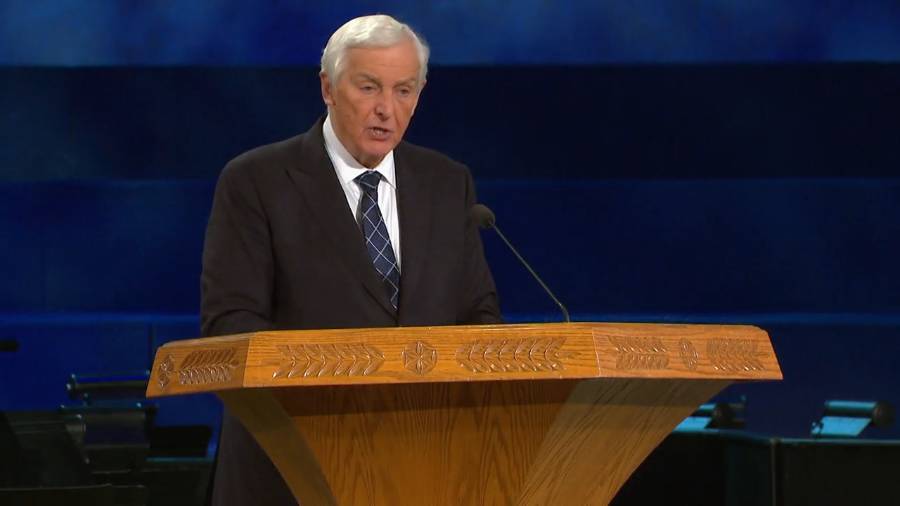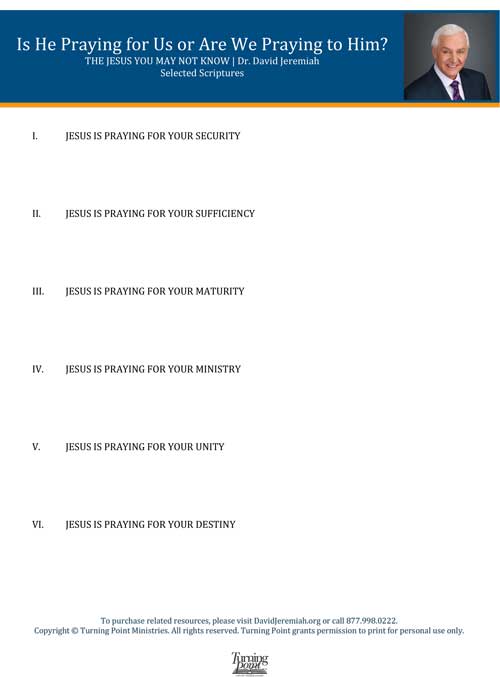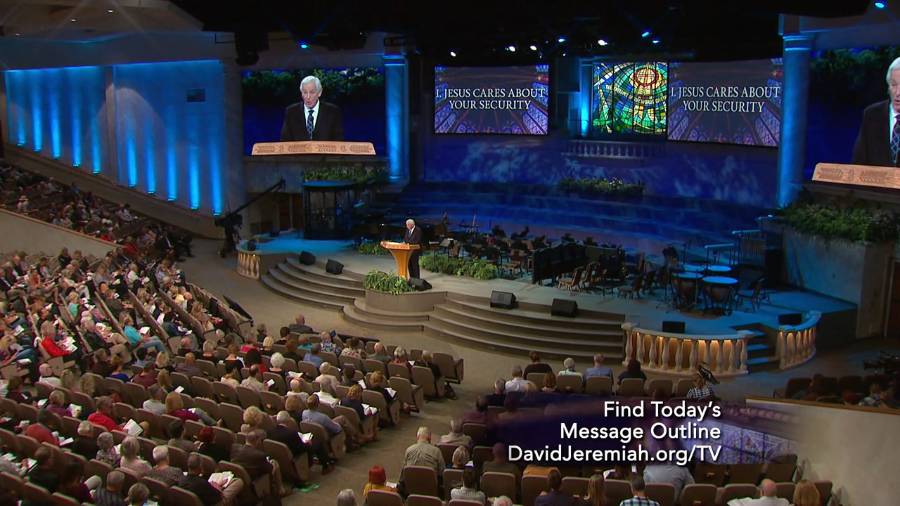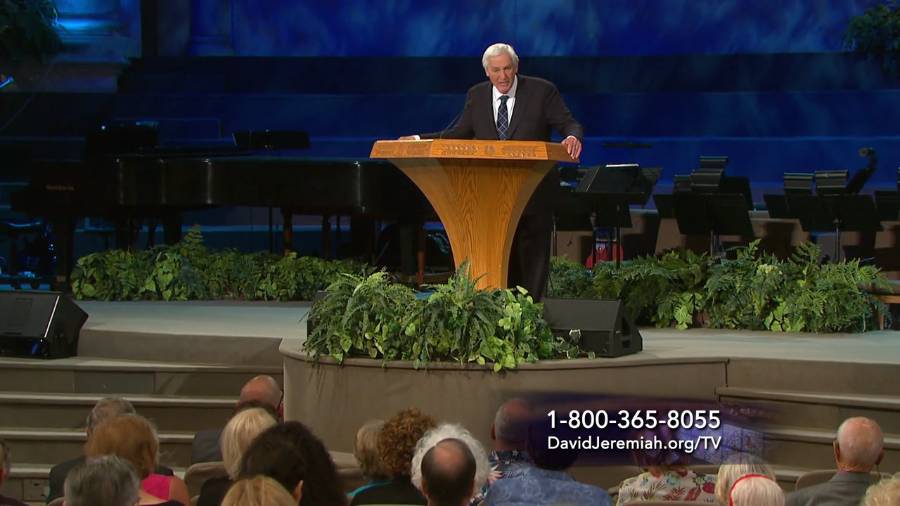The Jesus You May Not Know
Learn toFathomJesus like never before
Resources from David Jeremiah to aid in your journey from knowing about Jesus to knowing Jesus.
Is He Praying for Us or Are We Praying to Him?
Thanks for downloading your free resource!
Thanks for downloading your free resource!

One of the Most Intriguing Revelations in Scripture: The Present Ministry of Christ
From The Jeremiah Study Bible
By David Jeremiah
One of the most intriguing revelations in Scripture concerning activity in heaven is from the book of Job. There, Satan comes into the presence of God to accuse Job of being faithful only because God blesses him. So God gives Satan permission to remove Job’s blessings to prove his faithfulness.
Although this event took place many centuries prior to the ascension of Christ, the New Testament confirms that it serves as the backdrop for the present ministry of Christ, who defends the people of God from the accusations and allegations of the enemy.
Jesus Advocated for Peter
Jesus’ present ministry in heaven was hinted at in His earthly ministry. Just before His crucifixion, Jesus told Peter that Satan had done something eerily similar to what Satan did to Job: “Simon, Simon! Indeed, Satan has asked for you, that he may sift you as wheat.” In response, Jesus acted as an advocate and intercessor on Peter’s behalf: “But I have prayed for you, that your faith should not fail” (Luke 22:31, 32).
We know that Peter’s faith failed him temporarily when he denied knowing Christ on the eve of Jesus’ arrest—just as Job’s faith wavered as he tried to understand the test he was experiencing. But just as Job returned to even greater faith in God, so Peter’s faith was multiplied. Jesus’ advocacy and intercession for Peter were successful.
Jesus Advocates for Us
That event happened at Jesus’ final meal with His disciples, the same night on which Jesus again interceded for His followers while still on earth. Later, we have the record of Jesus’ High Priestly prayer (John 17), in which He foreshadows His coming duties as intercessor for His followers. Jesus prays for His original disciples (John 17:6–19); likewise, He prays for all who come to believe in Him (John 17:20–26).
Just as it was the duty of Israel’s High Priest to enter alone into the Most Holy Place on the Day of Atonement to intercede for the nation, so Jesus took upon Himself that role for the church:
“But Christ came as High Priest of the good things to come, with the greater and more perfect tabernacle not made with hands, that, not of this creation” (Hebrews 9:11).
Israel’s High Priest entered the presence of God to intercede in a tabernacle “made with hands”; Jesus now intercedes in a tabernacle “not of this creation”—the very presence of God Himself in heaven. Jesus’ present ministry of advocacy and intercession has everything to do with where He is now seated: “the right hand of God” (Romans 8:34). If Satan comes into the presence of God to accuse one of the followers of Christ, the Intercessor is there, at God’s right hand, to hear the charge and move to defend and advocate for that person.
Why Do We Need an Advocate?
In the book of Revelation, Satan is described as the one who accuses the followers of Christ before God “day and night” (Revelation 12:10). Think of the scene in Job 1 and 2—Satan accusing the righteous Job of being insincere in his faith. Now multiply it by the number of Christians in the world and the number of sins we commit and the weaknesses we manifest. It is enough to keep Satan constantly busy, accusing us of duplicity, sin, insincerity, and the like.
It is God’s will that we avoid sin; however, “if anyone sins, we have an Advocate with the Father, Jesus Christ the righteous” (1 John 2:1).
Like a lawyer in a courtroom, Jesus pleads our case before the Father.
He does not defend us for sinning; instead, He pleads His own precious blood as the price paid to cover the sins of those who belong to Him.
One of the most important points the apostle Paul makes concerning the love of God has to do with Christ’s present ministry of intercession. When Paul asks rhetorically, “Who is he that condemns?” the answer is, “There is none who can condemn ‘God’s elect’—including Satan.” Why? Because “it is Christ who died, and furthermore is also risen, who is even at the right hand of God, who also makes intercession for us” (Romans 8:33, 34).
The same Person who took the punishment for our sins is the One who intercedes for His own. The One who intercedes for us “is the propitiation for our sins” (1 John 4:10)—and the Protector of our faith.
For Further Reading: 1 Timothy 2:5; Hebrews 6:19, 20; 9:24; 10:19–22
This article is an excerpt from The Jeremiah Study Bible
All rights reserved. No portion of this material may be reproduced, stored in a retrieval system, or transmitted in any form or by any means, except for brief quotations in critical reviews or articles, without the prior written permission of Worthy Publishing.
You Might Also Enjoy…
Thanks for downloading your free resource!
Thanks for downloading your free resource!






















